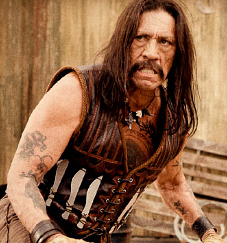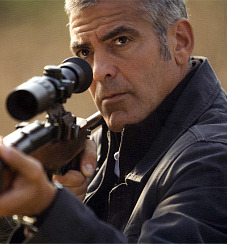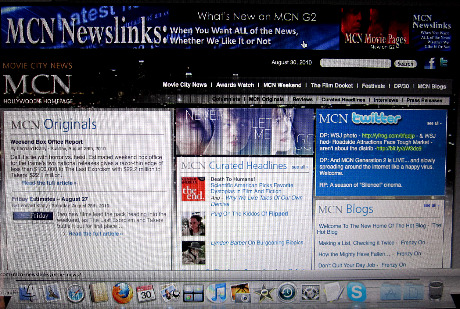“We wanted to do a movie in the vein of the ’70s foreign films that influenced so many great filmmakers today,” George Clooney recently told L.A. Times reporter John Horn for a piece that ran yesterday. “We felt if we kept the budget low, that the outside influences (like a studio) would be minimal and we were lucky that Focus was on board with the concept from the beginning.”
“On board”? As in believing in Clooney and director Anton Corbijn‘s vision, embracing it, standing behind it, and giving the marketing effort the old college try? Focus Features marketers have run ads and TV spots and decided to open it in 200 theatres, but they’ve all but abandoned any attempt to sell it with interviews. Clooney has done almost nothing, and Corbijn hasn’t even come to the States for the opening.
The American “is a cinematic anomaly,” Horn writes. “A U.S. production that in look, pacing and casting is more European than Clooney’s own Italian villa.
“‘I’m sure a lot of people will think it’s on the slow side of things,’ says Corbijn, whose previous film, 2007’s Control, was a critically acclaimed (but little seen) fictionalized biography of Ian Curtis, the lead singer of the British post-punk band Joy Division who committed suicide in 1980. ‘But I think there is too much explaining in films sometimes. Yes, there’s not a lot of back story on George’s character. But it’s enough for me to follow the metamorphosis that he is trying to achieve.”
“The American is very much a tale of a man alone, and to highlight that vision the filmmakers not only switched its protagonist’s nationality (he’s English in the novel) but also surrounded Clooney with a cast and crew almost exclusively European. At a very late stage, Corbijn even recast the part of Jack’s boss, replacing U.S. actor Bruce Altman with the Belgian performer Johan Leysen.
“Rather than pack pages of expositional dialogue into the script (credited to Rowan Joffe, following drafts by numerous other writers over years of revisions), Corbijn, who is best known as a photographer, relied on long, lingering shots of Jack and the Italian countryside. ‘We were trying to make,’ the director says, ‘a film that had a lot of beauty in it.”
“Corbijn also ‘looked at the film like a western, a morality tale of good versus evil,” he says. ‘Someone has done something bad and wants to escape it, but the past catches up to him.”
“‘Anton is an artist,’ says Clooney producing partner Grant Heslov. ‘And he’s never going to tell a movie in a straightforward way. He’s willing to sit on a shot for a while and not cut away. There are going to be people who are going to be absolutely frustrated by it.'”



